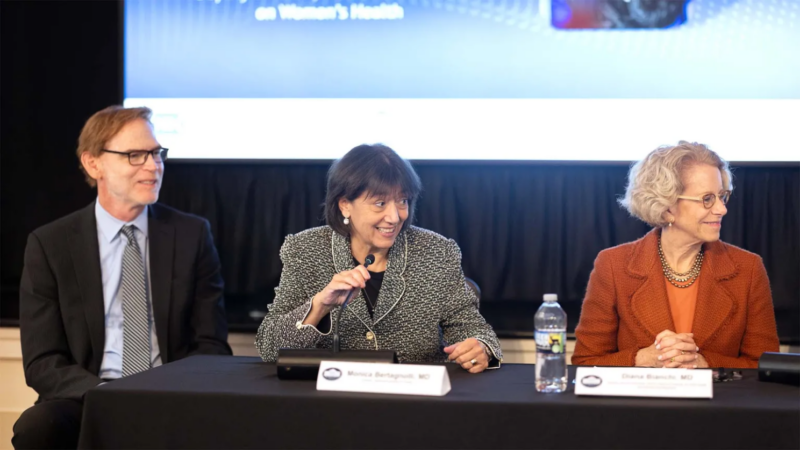Monica Bertagnolli, Director of the National Institute of Health, shared a post on LinkedIn:
“Last month I had the pleasure of joining my NIH colleagues for a workshop with The White House on advancing women’s health research. Read more on my blog about NIH’s commitment to transforming our approach to conducting research for women.

Advancing a Whole-Person Approach to Women’s Health Research
So many women—myself included—have benefitted from significant medical breakthroughs over the past 60 years. As a breast cancer survivor, I’ve been fortunate to have access to excellent care. And the evidence that guided that care came directly from NIH-funded research over the past five decades. From the development of the HPV vaccine to prevent cervical cancer, to the use of statins to reduce heart disease and stroke, to effective approaches to maintaining bone health after menopause—NIH research has led to numerous breakthroughs that improve the health and well-being of women and people assigned female at birth (referred to hereafter as women).
However, we know that women across the country are searching for answers to improve their health. They’re trying to manage flare-ups from autoimmune diseases. They’re dealing with chronic pain. They’re coping with postpartum depression. For these experiences and more, we still have much work to do.
On Oct. 29, 2024, I was pleased to join a workshop at the White House as part of the White House Initiative on Women’s Health Research. The event convened experts from across NIH to highlight interdisciplinary research advances in women’s health and to discuss future priorities. The White House Initiative aims to fundamentally change how our nation approaches and funds women’s health research.
Our vision at NIH takes a whole-person approach throughout a woman’s lifetime, recognizing that many interconnected factors contribute to health and disease. From the genes we inherit to the environments we live in and other social determinants, our health is determined by a multitude of biological, social, structural, and other factors. For all areas of influence, women have their own unique experiences and needs.
The role of women in society has changed dramatically in the past 60 years. Women are more educated—currently more young women than men are entering college, and many more women are entering previously male-dominated careers. Women’s economic status has improved, though women at all levels still earn less than their male counterparts. We are only beginning to understand how factors like educational attainment, economic status, gender, and other societal and structural influences affect women’s health.

In the past, research studies purposely excluded women. In fact, many lifesaving medicines that entered the market before the early 1990s were initially only evaluated in men. Today, representation among men and women in NIH-supported research is comparable thanks to a 1993 law requiring inclusion of women and minorities in research.
Equitable participation in clinical research and advances in our understanding of human biology have led to numerous breakthroughs. However, we still have a lot to learn about biological differences between males and females and how those differences impact health.
That’s why NIH implemented a policy in 2016 requiring researchers to consider biological sex as a factor that could meaningfully affect the outcome of a research study, from work in cells to clinical trials. A breakthrough that I covered earlier this year on this blog underscores the importance of sex as a biological variable.
Researchers found that a molecule produced by cells with two X chromosomes can trigger strong autoimmune responses, possibly explaining why autoimmune diseases are much more common in women. We are just beginning to tap into the potential of exploring how these and other differences in basic biology can guide more effective care for women.
NIH’s approach to women’s health research is laid out in a new fact sheet and an updated strategic plan. NIH research addresses conditions unique to women, such as endometriosis and uterine fibroids, as well as those that affect women disproportionately or differently. For example, women are more likely than men to have certain health conditions such as Alzheimer’s disease, anxiety and depression disorders, and certain cancers.
Importantly, we’re renewing our commitment to investing in programs that address issues significant to women across the lifespan, particularly at the health inflection points of menarche, pregnancy, and menopause. Too many women in the U.S. die during or after pregnancy, and even more women face significant health issues during this time.
Maternal health/pregnancy-associated disparities continue to persist, especially among Black women. Caring for women during and after pregnancy requires attention to mental health, cardiovascular disease, nutrition, infectious disease, and substance use. NIH’s plan emphasizes interdisciplinary research to better understand how all of these factors affect a woman’s health and well-being.
NIH has committed $200 million in fiscal year 2025 to supporting cross-cutting research focused on the health needs of women. We also issued a Notice of Special Interest to highlight our interest in receiving project applications on diseases and conditions that impact women differently, disproportionately, and uniquely across nearly all NIH Institutes and Centers. We are already considering close to 300 new applications for women’s health research projects.
The whole-person approach to women’s health allows researchers and clinicians to address unique needs throughout a woman’s lifetime and to provide a more complete picture of women’s health. It also must be integrated into all stages of the research process—from identifying innovative research questions, to producing impactful scientific and clinical results, to developing ways to equitably adopt new treatments.
It begins with science that convenes researchers and clinicians from different disciplines to accelerate progress through combined efforts and knowledge. The White House Initiative on Women’s Health Research calls for this comprehensive approach, renewing NIH’s commitment to research that addresses the needs of women everywhere. It demands that we approach this work with urgency, putting women and their lived experiences at its center of a focus on translating insights from biology and society into better health.
Links:
Advancing Women’s Health Research and Innovation Fact Sheet (NIH)
2024-2028 NIH-Wide Strategic Plan for Research on the Health of Women (NIH Office of Research on Women’s Health)
More posts featuring Monica Bertagnolli on oncodaily.com
Further Reading:
Monica Bertagnolli Receives NIAF Leonardo da Vinci Award for Health and Science
OncoInfluencers to Follow on Social Media: Dr. Monica Bertagnolli
Monica Bertagnolli is the Director of the National Institute of Health (NIH), USA. She is the President of Alliance for Clinical Trials In Oncology Foundation.
She previously served as the Richard E. Wilson Professor of Surgery in the field of surgical oncology at Harvard Medical School, a surgeon at Brigham and Women’s Hospital, and a member of the Gastrointestinal Cancer Treatment and Sarcoma Centers at Dana-Farber Cancer Institute.
Dr. Bertagnolli is the Founding Chair of the minimal Common Oncology Data Elements (mCODE) executive committee and has held multiple positions nationally, including being Past President and Chair of the Board of Directors of the American Society of Clinical Oncology. In 2021, she was elected to the National Academy of Medicine, having previously served on the National Academies National Cancer Policy Forum.


